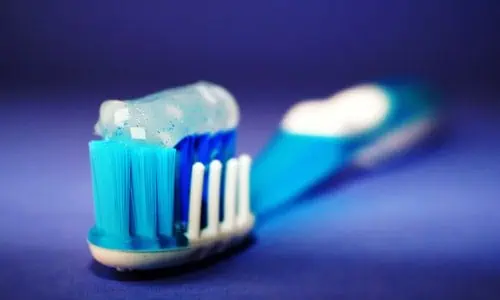Oral Health & COVID-19 Recovery

There have been close to 400 million cases of COVID-19 worldwide since the beginning of the pandemic. While one of the telltale signs of COVID can be loss of taste, among many other symptoms, there may be additional oral health concerns associated with a COVID-19 infection both during illness, as well as recovery. Your dentist in Douglasville is here to explain some potential oral health side effects of COVID-19.
Lesions or Ulcers
According to a study published in the Journal of Dental Research, over 80% of patients that were hospitalized with COVID-19 noticed lesions or ulcers in their mouths. Why would this happen as a result of respiratory disease? Well, the truth is, the respiratory system begins in the mouth and the nose, so it’s not uncommon for these areas to be affected. Keep in mind, ulcers should go away on their own. If they don’t schedule an appointment with your dentist in Douglasville. Besides ulcers and lesions, some patients also experience something coined “COVID tongue.” The symptoms of COVID tongue can range from loss of papilla (the teeny bumps on the tongue), enlarged tastebuds, or a burning taste or sensation.
Dry Mouth
Dry mouth is estimated to affect up to 65% of the population and is not a unique side effect of COVID-19. However, it can develop or become worse during or after infection. When we get sick with COVID, the virus can cause salivary glands to underproduce saliva. Healthy saliva flow is what allows our mouths to feel moist and comfortable, and it also helps reduce the risk of decay. Without enough saliva, the mouth may feel overly dry, you may experience bad breath, and you may be more likely to develop serious health problems such as gum disease. If you’re suffering from a dry mouth, drink lots of water every day, chew gum, and make sure to talk with your dentist in Douglasville.
Inflammation
One of the main concerns associated with COVID-19 is how the body responds to the infection, causing sometimes extreme levels of inflammation in certain parts of the body. This inflammation can also occur in the mouth. The gums are usually the most obviously affected, and COVID-19 long-haulers may notice red, swollen, and sometimes bleeding gums after recovery. It’s important to keep an eye on gum inflammation as it can also lead to or be a sign of gum disease. Gum disease does have connections to overall health and has been linked to an increased risk of heart disease, stroke, and respiratory disease. With that said, those with active gum disease when they become infected with COVID are more likely to have a serious case.
While some people find COVID-19 recovery simple, some of the 400 million people infected continue to experience long-term side effects. If you’re one of them and you have lingering oral health side effects, don’t hesitate to contact your dentist in Douglasville to schedule an appointment.
What Toothbrush Should I Use?

There are so many different kinds of toothbrushes to choose from, and while they may all look the same outside of the color, not all brushes work the same. In fact, there are some big differences between the types of toothbrushes available, and it can be difficult to know which one will be right for you. To help you find the perfect toothbrush to fit your oral health needs, check out this guide from your dentist in Douglasville.
The Bristles
One of the most important things to consider when deciding on which toothbrush to use is the bristles. When your dentist in Douglasville considers the bristles of a toothbrush, they look for two things – the shape and the density.
- Shape – Bristles are either straight or rounded, and this difference is sometimes very subtle, so make sure to look closely. Rounded bristles are usually recommended for most people as they’re effective at removing plaque and bacteria while also being gentle. Straight bristles, on the other hand, can cause gum or enamel damage, especially if you brush too hard.
- Density – Toothbrush packaging will also list information about how dense the bristles are. You’ll see this referenced as soft, medium, or hard. Most likely, your dentist in Douglasville will recommend that you use a soft-bristled toothbrush as opposed to a medium or hard. Soft bristles are gentle enough to get a thorough clean while not causing damage to your teeth or gums.
The Size
Sometimes, bigger is better. But not when it comes to your toothbrush. You don’t want a toothbrush that you can’t comfortably fit in your mouth or one that’s too difficult to manage. Look for a toothbrush that has an appropriately-sized head and handle. The head should be large enough to be able to brush two teeth at once but not too large that you can’t reach your back teeth.
The Cost
The cost of toothbrushes can vary greatly depending on a variety of factors. The most obvious is whether you’re looking to buy a manual toothbrush or an electric toothbrush. Electric toothbrushes and their replacement heads are often more expensive than manual toothbrushes. However, if you’re someone who finds manual toothbrushes difficult to use, an electric toothbrush may be recommended. Don’t worry though, there are now affordable electric toothbrushes that your dentist can recommend.
The ADA Seal of Approval
No matter if you choose a manual toothbrush or an electric toothbrush, make sure you look for the ADA Seal of Approval. Toothbrushes that have earned the seal have undergone testing to make sure they’re safe, durable, and won’t increase the risk of gum or enamel damage.
So, which toothbrush should you use? The one that you will pick up every morning and night and use for two minutes. However, we also want to make sure that your toothbrush isn’t doing more harm than good, so talk with your dentist in Douglasville about which toothbrush you typically use and see if they have any other suggestions for you based on your specific oral health needs.



